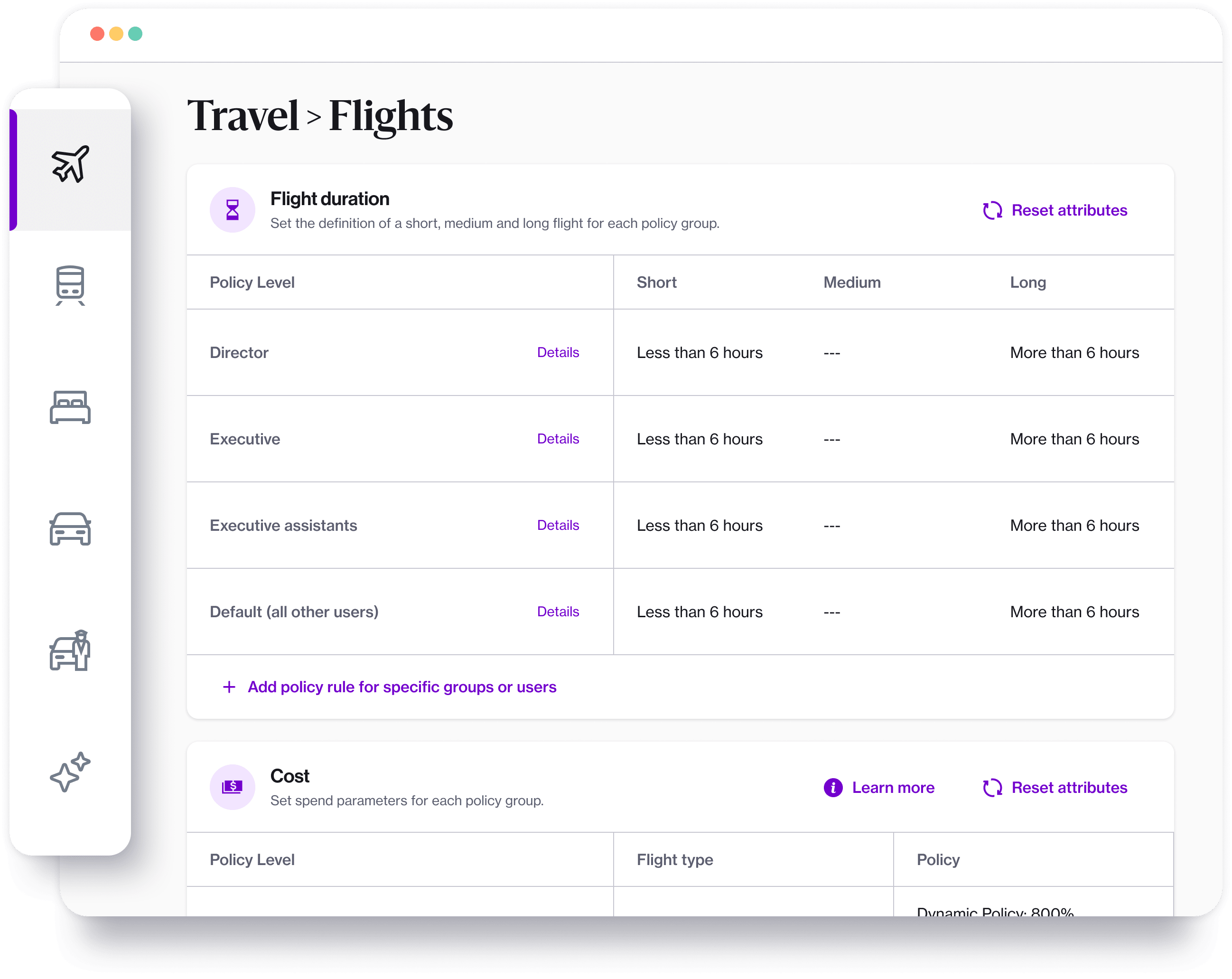Business Class Travel Policy: A Guide for Corporate Decision-Makers

Business class flights aren’t just about luxury; they can be a strategic investment for company representatives. But deciding when to allow employees to indulge in business class instead of economy can be tricky. The wrong business class travel policy could either blow your travel budget or leave your top performers burned out from long-haul economy flights before crucial client meetings.
The key is to develop a policy that balances fiscal responsibility with strategic employee investment. This means establishing clear eligibility criteria, flight duration thresholds, and approval processes that align with your company’s goals and industry standards.
Here’s a practical guide to help travel managers assess the “yes” to business class in their travel policy.
The Case for Including Business Class Flights in Your Corporate Travel Policy
Cost implications are the most obvious constraint to allowing business class travel. Business class flights are often two to three times the price of economy; international business fares average $2,525, and domestic fares $990. For organizations with frequent travelers, these costs add up quickly.
However, employee productivity and comfort benefits can offset the higher prices. Business class amenities — such as lie-flat seats, higher-quality meals, and priority boarding — enable employees to work or rest more effectively during flights. Particularly for long-haul flights, the ability to arrive refreshed and ready for meetings could be worth the investment.
Beyond the Bill: Why Business Class Has a Place in Corporate Travel
A well-defined corporate travel policy with a business class provision sends a clear message that employee comfort, well-being, and time matter. For frequent travelers, business class offers much-needed room and quieter spaces for employees to recharge. This advantage can translate to heightened productivity, sharper performance, and a competitive edge during client engagements or pivotal meetings.
By including business class travel in the corporate travel policy, companies enhance the on-the-road experience and can also boost employee morale and loyalty. These luxurious perks can become powerful recruiting and retention tools, making an organization more attractive to top talent and cultivating a more committed workforce.
How personal travel boosts well-being
A top-notch corporate travel platform can do more than streamline business travel — it can provide employees with exclusive discounts for personal trips. With the right solution, employees enjoy discounted rates on flights, hotels, and other travel expenses for personal travel on the same platform that they book business travel, which also has the added benefit of simplifying the booking process. This added perk boosts satisfaction, as employees can use a familiar tool for both work and personal travel, with access to savings typically reserved for corporate use.
Industry Standards: Aligning Policies with Competitors
Of course, a best-in-class policy is never a blank check. The most effective corporate travel policies set clear guidelines for when business class is appropriate, so that the benefits are balanced with financial responsibility. Many companies adopt corporate travel policies that mirror industry standards to remain competitive. For example, it’s standard practice to allow business class on flights exceeding a specific duration, such as four to five hours, or for senior roles.
Adopting a policy that aligns with industry standards can keep travel policies competitive and help businesses retain talent while avoiding policy dissatisfaction. By defining the circumstances for business class bookings, companies can control costs while reinforcing a culture that values people and performance.
Finding a Balanced Approach
For many companies, a flexible approach to business class travel works best, which means having a policy that allows it under specific conditions rather than a blanket policy. Here are some scenarios where upgrading might be a smart move:
- Long-haul flights: Consider allowing business class to help employees arrive rested on flights longer than six hours.
- Critical meetings: If a trip involves high-stakes engagements, investing in business class could boost performance.
- Senior execs or frequent travelers: Senior executives or employees with frequent travel schedules may benefit from increased comfort, which can help them maintain energy levels and reduce burnout.
By implementing flexible policies that permit business class only under specific circumstances, companies can offer employees a better travel experience without costs spinning out of control.

A close look at flight policy settings using the Navan desktop app
Leveling up your travel policy
Corporate travel companies with automated policy enforcement make it easy to build flexible travel policies by allowing managers to assign perks based on specific policy levels. Unlike legacy systems, which often require time-consuming manual adjustments and approvals, advanced software saves travel managers from the complexity and delays in policy configuration and enforcement.
Optimizing Your Business Class Travel Policy
A flexible business class travel policy that considers trip length, employee role, and the business needs of each trip can be a game-changer for road warriors and C-level travelers.
Ready to access a multi-source inventory travel solution with exclusive business class rates? Discover how to up the ante with Navan; book a demo.
This content is for informational purposes only. It doesn't necessarily reflect the views of Navan and should not be construed as legal, tax, benefits, financial, accounting, or other advice. If you need specific advice for your business, please consult with an expert, as rules and regulations change regularly.
More content you might like
Take Travel and Expense Further with Navan
Move faster, stay compliant, and save smarter.


